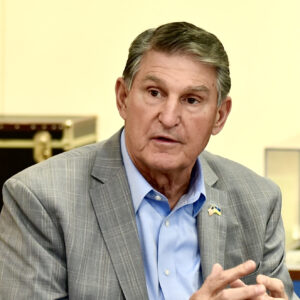As America turns its eyes to New Hampshire and the First in the Nation presidential primary, a group of concerned politicians and activists want to turn the nation’s attention to its $34 trillion federal debt crisis.
That was why a group of fiscal hawks gathered in Manchester, N.H., last week for a debt and deficits roundtable, a topic so hot the event drew a surprise visit from Sen. Joe Manchin (D-W.Va.).
“I’ve seen it up close and personal for 14 years, and I’ve watched us accumulate debt at a more rapid rate than at any point in the history of our country,” Manchin told the roundtable. “There’s no checks and balances.”
Manchin was in the Granite State as part of a listening tour promoting his Americans Together organization, whose goal is advocating bipartisan solutions to the nation’s problems. One of his top priorities is debt and spending.
The complaint from roundtable participants like former U.S. Comptroller David M. Walker is that presidential candidates in both parties are giving little attention to the debt crisis issue. That, said Walker, is a failure of leadership.
“Four factors are necessary to be a superpower in today’s world: global economic power, global diplomatic influence, global military capabilities, and global cultural influence,” said Walker. “We have that today, but the leading indicator on the way up and the way down is economic power, and if you can’t put your finances in order, you will not maintain economic power over time.”
How bad is the nation’s debt problem?
Manchin recounted his first Senate Armed Services Committee meeting, during which then-Chairman of the Joint Chiefs of Staff Michael Mullen was asked to name the greatest threat facing the United States.
“He said the debt of the nation will take us down before any other military power does. The debt of our nation will take us down first,” Manchin said. Federal debt at the time was $10.5 trillion— less than one-third of what it is today.
New Hampshire state Senate president and former GOP congressman Jeb Bradley laid it out with simple math.
“If you are a federal taxpayer, it’s about $260,000 per person,” Bradley said, adding that debt reduction is coming — whether politicians are ready or not.
“It will either happen because we come together as a nation, or it’ll happen to us when we can no longer borrow the kind of money that we have to do and then we just print the money. And if you think inflation under Joe Biden is bad, wait until we start to print the money.”
Another panelist was businessman Joe Penland, who uses the moniker “Joe From Texas” to push for more citizen engagement and demand that elected officials step up on behalf of average Americans.
Penland said America’s debt is equal to the combined GDP of five other countries: China, Japan, Germany, India, and the United Kingdom. Japan, in particular, is now the U.S.’s top foreign lender, holding about $1.1 trillion in debt as of last October.
“I think that’s an embarrassment,” Penland said. “How can you be the superpower in 1945 and go from there to borrowing money from the country that you bombed with an atomic bomb?”
America must put its fiscal house in order, added Penland. “If America fails, then the rest of the world is going to be in trouble too because the rest of the world looks to us.”
Taxpayer groups agree that something must be done, and fast.
“The truth is we have created this mess from both sides of the aisle, from both political parties, for quite a number of years,” Pete Sepp with the National Taxpayers Union told InsideSources. “Candidates need to own up to that and start talking about it in a more serious fashion. Not just talking about it more often, but talking about it more seriously.”
Pointing to the $34 trillion debt, David Williams of Taxpayers Protection Alliance said there are also unfunded liabilities that will explode the debt to more than $100 trillion. That means interest payments that could eclipse $1 trillion in just five to 10 years. Meanwhile, countries we borrowed from could someday come calling for their money.
“That could be disastrous for the economy of the United States because we don’t have the cash, and that could mean higher interest rates, and that could mean an economy absolutely collapsing,” said Williams. “That could affect everyone from the higher income to the lower income. So, it is really a risk that politicians are taking by continuing to rack up deficits and debt.”
During the panel discussion, Walker outlined a solution. One part is a fiscal commission tasked with both educating the public about the scale of the problem and the need to make tough choices. It would also recommend a package of fiscal measures that would get an up-or-down vote from Congress.
Walker also called for a constitutional amendment limiting debt as a percentage of the economy the U.S. can carry.
The challenge, said Penland, would be getting the average citizen to believe the government was offering solutions and not just more self-serving politics.
Most Americans, he said, don’t believe Washington wants to do the right thing for them or that it has the courage to do so.
Each panelist nodded in agreement.
“We’re completely off the chart,” Penland said. “They (politicians) say they don’t want to touch the third rail? Well, we’re off the railroad.”

